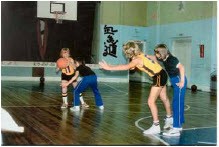I discovered Appreciative Inquiry in 2005 when I first met my business partner, Sue James, at a network meeting.
But before I knew about Appreciative Inquiry – and even before the concept of AI was created – I could relate to what much later became the Principles of Appreciative Inquiry.
One example, during my junior basketball coaching days in the 1970’s, involved the Enactment Principle – when acting ‘as-if’ is a self fulfulling process.
In 1974 I was involved in the setting up of the Sandringham Basketball Club, now called Southern Basketball Association. One of my responsibilities was the development of the junior boys’ representative teams. In 1975 we entered teams into the Victorian Junior Championships competition, the premier competition for juniors at that time. Our goal was to make A grade, where there were several future National Basketball League and Australian Olympic players.
In three seasons one of our boys’ teams went from C grade to A grade. But although they were playing in A grade, the team had only one legitimate A grade player. The rest of the team had B grade skills.
As coach, my focus was to build on the strengths of the team, such as teamwork and defence, so they could at least have a chance to survive in this top league.
The other challenge was to get the team to act as A grade players even though all but one was at a B grade level. The coaching strategy was to get every member of the team to train and think as an A grade player. In other words they had to act as A grade players even though they didn’t yet have the skills.
Results of games were largely irrelevant, apart from trying to survive in A grade. This usually meant winning two or three games a season, which was achievable for our team – although the strong desire to win every game we played was always there.
It wasn’t easy playing against Australia’s top players, but with every game the team started to believe they were A grade players. Granted, not top A grade players – but A grade players nevertheless.
The more they acted ‘as if’ they were A grade players, the more they believed it – and the more their skills improved.
Eventually they convinced themselves, and at that point they were no longer acting. They were indeed A grade players.
The core of that team, three seasons later, made the U/15A summer semi-finals which was a major achievement for a small club like Sandringham.
Footnote: For more personal basketball stories read the Reflections parts of Sandringham Sabres: The First 25 years – 1974-1999 – an ebook I compiled and edited. Sue James did the cover design and layout.

 Our monthly newsletter
Our monthly newsletter
Speak Your Mind